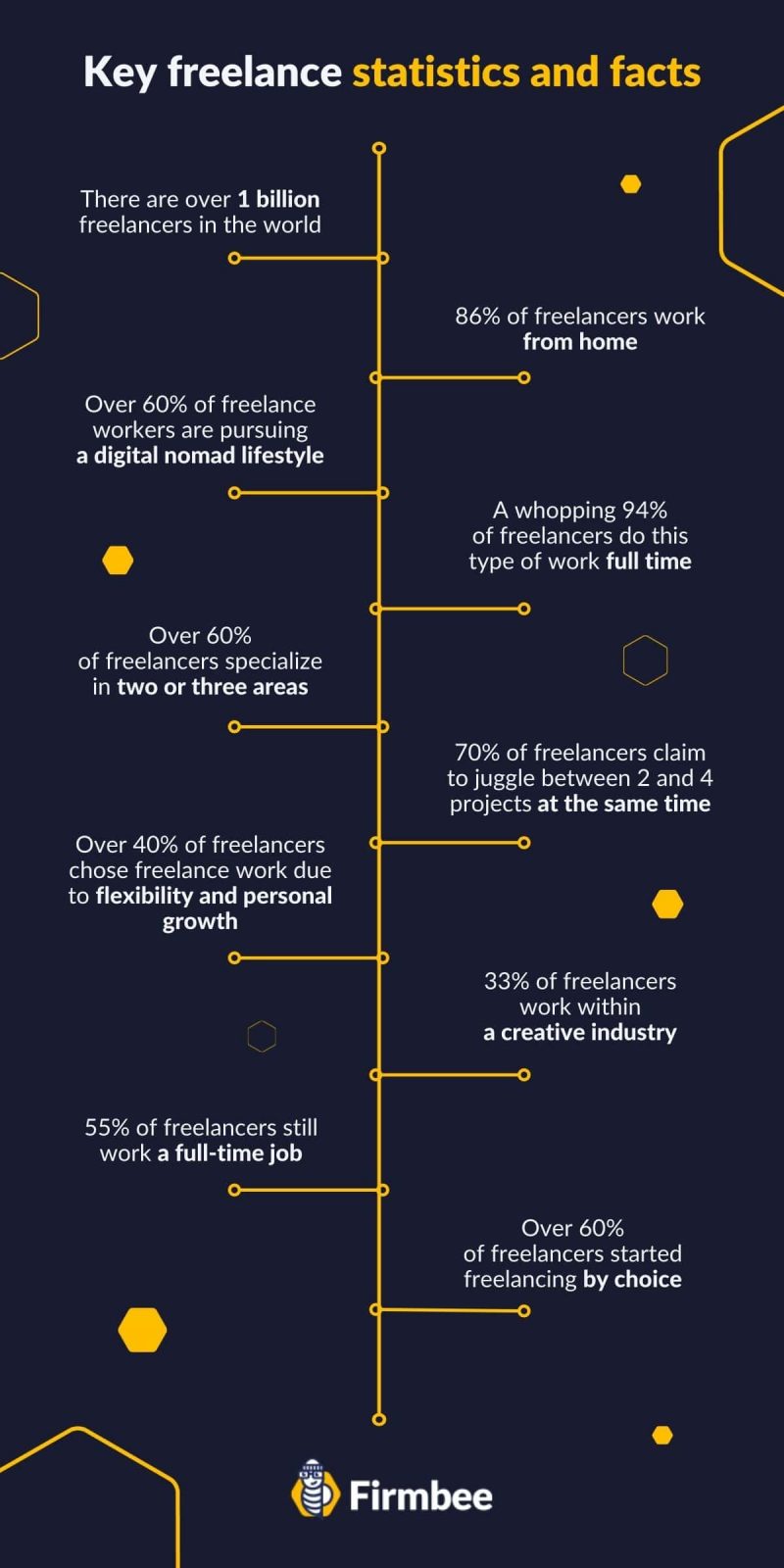Freelance work brings many advantages. Freelance worker has independence and freedom but such benefits are not available to full-time employees, who are employed on the basis of a typical labour contract. Full-time employees, on the other hand, have stability, freelancer workers cannot hope for. Is it better to be a freelancer or full-time worker? Working full-time and freelancing – which option is better, more advantageous, and why? – these issues will be discussed in the article.
Working full-time and freelancing – table of contents:
- Flexibility or stability
- Benefits and other advantages
- Monitoring of work and freedom of choice
- Work and social life
- Summary
Flexibility or stability
The way we work has changed significantly during the last years. Most of the changes are related to the development of modern technologies as well as with the Covid-19 pandemics. The way we do business has changed as well. Broad access to the technological solutions for remote work has transformed our definition of work and the workplace.
More and more people work from home as consultants or independent contractors. A number of online platforms for freelance work, such as Upwork or Fiverr, is constantly growing. The main difference between full-time employment and freelance work is the flexibility of work in relation to the tasks performed.
Full-time employees are provided with stability of working conditions, and in consequence they receive, contractually fixed, steady salary. Their work schedule is fixed in advance as well. All this allows them to keep control over their obligations and the household budget.
This form of employment has limitations as well – for example: it is impossible to earn more above the previously agreed salary, because full-time employee may take only a certain number of paid overtime hours.
Things are different in case of freelancers. Independent contractors don’t receive remuneration for a day’s work. The amount of duties may vary considerably each day. Their monthly income is sometimes not predictable and depends on the overall quantity of assignments. On the other side, freelancers have the possibility to perform their tasks from any place in the world at any time of the day.
Have the possibility to perform their tasks from any place in the world, at any time of the day. Additionally, they can provide services for many different companies and this may help to increase their income.
Benefits and other advantages
Employees employed on the basis of full-time contract have access to additional benefits such as: health insurance, paid annual leave, sick or parental leave. Companies focused at raising competencies of their employees organize training sessions which allow to develop skills of all team members.
Freelancers, due to the specificity of their work, have no access to all those advantages and benefits. They have to get the health insurance independently as well as to plan for the retirement on their own. Without full-time employment contract they cannot take time off or use of paid leave holidays. If they need to improve their skills they have to pay for the training sessions on their own.

Monitoring of work and freedom of choice
In case of full-time employment, individuals agree to follow the rules predetermined in the work agreement. With those regulations full-time employees have no freedom of action and they have to discuss all the changes related to work with their supervisor.
Freelancers can act more independently. They can decide about types of project they wish to realize and determine how many hours they wish to work each day. They may reject the project, they have no interest in without consequences that full-time workers would have to face in similar situation.
Work and social life
Full-time employment means that the employee has to spend his time in the same group of people each day. This helps to make strong bonds between the team members, and encourages making new friends at work. Long working hours affect the private life of the employee. There is less time for family members and friends outside the inner circle of work colleagues.
Freelancers spend most of their working time alone. If there is any need for cooperation, all is usually done remotely. It makes it more difficult for freelancers to socialize, make friends and build strong bonds. Due to flexibility of their schedule, freelancers may spend more time with their family, and may postpone certain task when there is need to do so, as a result they may balance their work and family time more effectively.
Working full-time and freelancing – summary
Working full-time and freelancing are the two different styles of work. Is it better to be a freelancer or full-time worker? Which option is more beneficial? The answer depends on many factors. The choice of either option depends on personality of the employee and his expectations related to personal and professional life. For individuals, who value stability, predictability, team work and strong bonds with people, full-time employment is better option.
For well-motivated individuals, who value diversity of everyday tasks freelance employment is better option. Any person, who wishes to be his own boss and to be able to decide, about the type of tasks and time of their performance should consider freelance work.
To make the right decision the individual concerned should analyze his own preferences alongside the problems discussed in the text. This should help to make the best choice between working full-time and freelancing. Fortunately, there is no risk involved, and all recruitment decisions can be changed.
Read also: How to implement freelance management system
If you like our content, join our busy bees community on Facebook and Twitter.
Author: Nicole Mankin
HR manager with an excellent ability to build a positive atmosphere and create a valuable environment for employees. She loves to see the potential of talented people and mobilize them to develop.


















